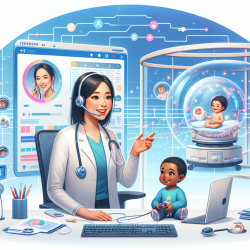As a speech-language pathologist dedicated to improving outcomes for children, it is essential to stay informed about the latest advancements in health technologies. The research article titled Emerging Therapeutic Enhancement Enabling Health Technologies and Their Discourses: What Is Discussed within the Health Domain? provides valuable insights into how these technologies are shaping the future of therapy.
The study explores various emerging technologies such as neuroenhancement, cognitive enhancement, brain-machine interfaces (BMI), and social robotics. These technologies hold significant potential to revolutionize therapy practices, particularly in speech-language pathology. However, the research also highlights some critical gaps in current discussions, particularly around healthcare policy and ethics.
Key Findings and Implications for Practitioners
Here are some of the essential findings from the study and how they can be applied to improve therapy outcomes for children:
- Neuroenhancement and Cognitive Enhancement: These technologies can potentially enhance cognitive abilities beyond typical human capabilities. For practitioners, this means exploring new therapeutic approaches that leverage these advancements to support children with cognitive and learning disabilities.
- Brain-Machine Interfaces (BMI): While BMIs are often discussed in technical terms, their application in therapeutic settings is less explored. Practitioners should consider how BMIs can be integrated into therapy to assist children with severe communication impairments.
- Social Robotics: The use of social robots in therapy is a growing field. These robots can provide interactive and engaging therapy sessions, especially for children with autism spectrum disorders. Practitioners should stay updated on the latest developments in social robotics to incorporate these tools into their practice.
Encouraging Further Research
While the study provides a comprehensive overview of emerging technologies, it also identifies areas where further research is needed. Practitioners are encouraged to contribute to this growing body of knowledge by conducting studies and sharing their findings. Key areas for further research include:
- Healthcare Policy and Ethics: More research is needed to understand the ethical implications of using these technologies in therapy. Practitioners should advocate for policies that ensure the safe and ethical use of emerging technologies.
- Consumer Involvement: The study highlights the need for greater involvement of health consumers, including children and their families, in the development and assessment of these technologies. Practitioners can play a crucial role in facilitating this involvement.
- Evidence-Based Practice: There is a need for more robust evidence to support the use of these technologies in therapy. Practitioners should prioritize evidence-based practices and contribute to research efforts that provide solid evidence of the effectiveness of these technologies.
By staying informed about the latest advancements and actively contributing to research, practitioners can ensure they are providing the best possible care for children. The integration of emerging technologies into therapy practices holds the promise of significantly improving outcomes for children with various disabilities.
To read the original research paper, please follow this link: Emerging Therapeutic Enhancement Enabling Health Technologies and Their Discourses: What Is Discussed within the Health Domain?










